Electric Three-Wheeler Scene Is Turning Exciting In India
- By Bhushan Mhapralkar
- September 29, 2023
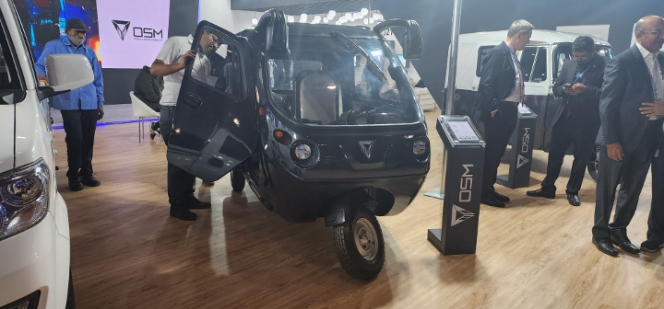
There are about 51 electric three-wheeler manufacturers in India as per the data of the Ministry of Corporate Affairs. Of this a good number of companies could be termed as startups. They are young and dynamic. They are technologically very well oriented and belong to the 400 startups that are estimated to be currently operating the auto sector.
Perhaps the most vibrant and diverse with a unique mix of entrepreneurs and technologists as part of the core team, the electric three-wheeler manufacturers seem better poised to grow because of their ability to understand and address the various segments on the passenger side as well as the cargo side.
There’s competition from the unorganised sector, the products of which – mainly catering to last mile passenger segments – are found in many cities of North India such as Amritsar and old parts of Delhi.
To add excitement to an already happening category in the Indian automotive market, US-based Biliti Electric Inc (Biliti) will conduct ‘ground breaking’ ceremony for its electric three-wheeler plant on the road that connects Hyderabad and Zaheerabad on 05 October 2023.
A young company that was founded in 2021 in California, Biliti is a growing global mobility player guided by a clear mission to provide smart, efficient and affordable electric mobility solutions, as per the description on its website.
Buoyed by the rising preference for electric vehicles and the way they seem poised to shape urban mobility and the cities of tomorrow, the American company engaged in the development of future-proof technologies will produce 240,000 units every year, according to sources aware of the development. The current plan is to make electric three-wheelers, they add.
Stating that the plant would be the world’s largest of its kind, the sources mention that the investment towards it is roughly USD 150 million. The ‘ground-breaking ceremony’ will be done at the hands of the Telangana Chief Minister K C Rao in the presence of government officials and members of the senior management of the company, the sources inform.
While the Biliti factory in Telangana is expected to provide employment to 3,000 people, it is also indicative of how the manufacturers are finding it worth making electric three-wheelers rather than electric two-wheelers or electric four-wheelers. The target audience or buyer/operator of a three-wheeler is grounded and knowledge enough to understand that suits his application needs in terms of the TCO, mentioned an industry observer. IT is therefore that companies like Omega Seiki, Euler and Altigreen has chosen to build electric three-wheeler over other types of electric vehicles, he added.
The B2B nature of electric three-wheeler business is perhaps the reason why so many unorganised players are a part of it, albeit at a different level. Many of them are job shops with far less investment than the startups.
The legacy players in the electric three-wheeler market and figuring in the list of SIAM (Society of Indian Automotive Manufacturers) are of the deep pocket variety. Those such as Bajaj Auto Ltd, Mahindra Electric (an arm of Mahindra & Mahindra) and TVS Motor Company are well diversified and technologically well entrenched. They are also well entrenched in areas like supply chain, manufacturing infrastructure and abilities, etc.
If the lower entry barrier in the EV space has attracted new and young players in the three-wheeler category, the legacy players are fast closing the gap. It is somewhat like what is happening in the electric two-wheeler space, the industry observer mentioned. He drew attention to how white spaces or segment gaps in this space are also being plugged.
Manufacturers like Tata Motors and Ashok Leyland are offering electric four-wheel light trucks to change the dynamics of the electric three-wheeler market the way it happened with the launch of the Tata Ace in 2005, he explained.
The competition is turning complex and it is essential therefore that electric three-wheeler manufacturers up the ante by employing more advanced technology; by offering superior TCO than their vehicles currently offer and give more bang for the money that the buyer is ready to pay them.
Among the young electric three-wheeler manufacturers, the likes of Altigreen, E-Trio, Omega Seiki and Euler Motors seem to be better placed to sustain and grow despite the competition from legacy players. The game seems to be about who offers the best TCO with the aid of technology. Incentives don’t seem to be a helping only to a point after looking at how the FAME Phase II policy was restructured for electric two-wheelers a few months ago.
The Government is keen to make electric vehicles in the country grow but does not seem to be in favour of much incentivisation like China did to make its EV industry rise. The PLI scheme for batteries is a welcome initiative though.
The effect of restructuring the subsidy for electric two-wheelers is not hidden. Their sales over the last few months have very well indicated it. The effect may be temporary, the fact is the Indian vehicle buyer is highly cost conscious.
The TCO factor matters most in the case of electric three-wheelers therefore. It is either the deal maker or deal breaker. To ensure a superior TCO is absolutely necessary. A lot of homework in this direction is yet to done.
The beauty is that some of the young and dynamic players have already acknowledged this and are silently working in that direction. They are leveraging the advantage of lower break even. The legacy players are well versed with the superior TCO factor and working in that direction too. The gap is expected to close between the legacy players and the young and newer players sooner than later. Such a development is already visible in the case of electric two-wheelers.
While technology, engineering, manufacturing, quality, durability, pricing, supply chain management and value chain management are some of the factors that will play a key role in shaping the future of electric three-wheelers, a prominent factor will be how co-operations work and are nurtured.
Co-operations will be extremely important for electric three-wheelers to succeed in a competitive market place where there is the pressure to reach the market early, stay exciting, frugal and technologically intensive.
While even the young electric three-wheeler companies have figured the art of sustenance and growth besides acquiring the necessary resources, engaging skilled manpower, supply chain partners and expanding their reach in the market, regulatory and technology changes will remain a constant.
The Government, it is clear, is looking at the EV industry to reduce tailpipe emissions. With companies such as BYD, Avatr and Changan of China set to flood the European markets with electric cars that are on par with what some of the best-known electric vehicle manufacturers like Tesla can offer at a price that is significantly lower, the unique status of the Indian EV market as the world’s largest micro mobility market in the making has the electric three-wheeler market in good stead.
The definition of electric micro mobility is defined as vehicles weighing less than 2.5-tonne. Most of the electric three-wheelers as the contributor to Indian EV market’s growth as the world’s largest micro mobility market are well defined in the last mile delivery segment as e-commerce players among others exert to reduce their carbon footprint. The excitement lies is what lays beyond the application areas that have already been addressed.
The semi-urban and rural markets are the ones that electric three-wheelers will next go to it looks like. As they do, yet another phase of strong growth and excitement will be unleashed.
- Eicher Trucks and Buses
- VE Commercial Vehicles
- VECV
- India Book of Records
- IBR
- Eicher Pro X
- Vinod Aggarwal
- SS Gill
- Abhishek Chaudhary
Eicher Pro X EV Completes Kashmir To Kanyakumari Journey In 6 Days
- By MT Bureau
- January 28, 2026
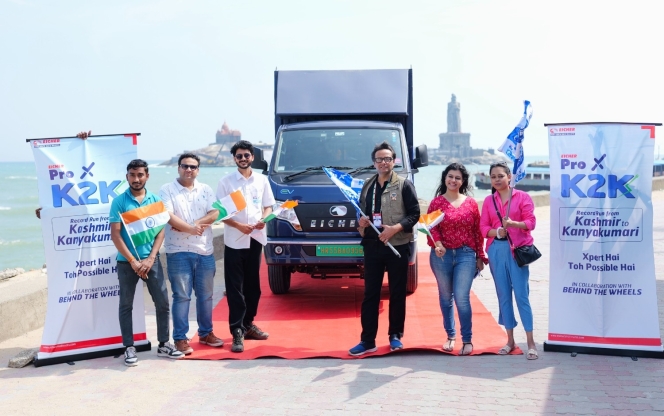
Eicher Trucks and Buses, part of VE Commercial Vehicles (VECV), has completed a journey from Kashmir to Kanyakumari using its Eicher Pro X EV.
The record verified by the India Book of Records (IBR), saw the electric vehicle cover over 4,000 kilometres in 6 days under loaded conditions. The run commenced in Srinagar on 20 January 2026 and concluded in Kanyakumari on 26 January 2026, traversing the Himalayas, plains and the Deccan Plateau.
Throughout the expedition, the vehicle utilised public chargers located via the MyEicher App. An adjudicator from the India Book of Records accompanied the truck to monitor route compliance, load, distance and charging stops. The mission served as a demonstration of electric vehicle endurance across diverse altitudes and climates to validate the technology for logistics corridors.
The journey was intended to show that electric commercial vehicles can operate beyond short-haul deliveries. By maintaining performance across hilly and coastal routes, the Pro X EV aimed to establish total cost of ownership (TCO) benefits and maintenance predictability for fleet operators. The successful completion of the route suggests that current charging infrastructure can support long-haul electric freight movement.
Vinod Aggarwal, MD & CEO, VE Commercial Vehicles, said, “For more than four decades, Eicher trucks and Buses have earned customer trust through leadership in fuel efficiency and application-specific engineering. The record-setting performance of the Eicher Pro X reinforces our unwavering focus on application excellence, reliability, and performance, anchored in robust product development and manufacturing capabilities, and enabled by a customer-centric, pan-India commercial and dealer network. I commend the entire Eicher team for achieving these well-deserved records”.
SS Gill, Chief Commercial Officer, VE Commercial Vehicles, said, “By covering the K2K route with a loaded Pro X EV, Eicher Trucks & Buses has proven that electric mobility is no longer restricted to short-haul, ‘last-mile’ deliveries. We are not just setting records, but through the strength of our service network and extensive dealer set-up, we are demonstrating that our EV technology is commercially viable, reliable, and has the range to serve as the backbone of India’s green logistics corridors”.
Abhishek Chaudhary, SVP – SCV Sales & Marketing, VE Commercial Vehicles, said, “The Eicher Pro X EV was put to the ultimate test – covering over 4000 kilometres across diverse climates and challenging altitudes. With this recognition from the India Book of Records we’ve moved beyond our own stringent testing benchmarks to real-world validation - Demonstrating that Eicher Pro X EV is a dependable partner for logistics movement across varied operations in India”.
- Montra Electric
- Murugappa Group
- PM E-Drive Scheme
- Rhino 5538 EV 6x4 Tractor trailer
- Narendra Modi
- H D Kumaraswamy
- Arun Murguappan
- Sathia Raj
- UltraTech Cement
Montra Electric Becomes First OEM To Receive PM E-Drive Certification For Heavy Trucks
- By MT Bureau
- January 28, 2026
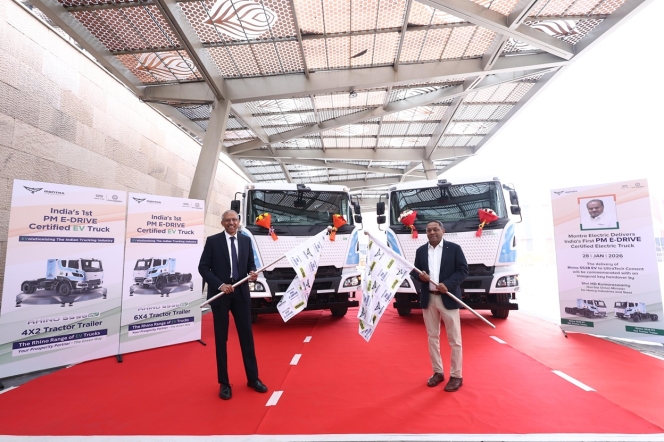
Montra Electric, the electric medium and heavy commercial vehicle business of the Murugappa Group, has become the first manufacturer in India to receive certification for heavy-duty electric trucks under the government's PM E-Drive Scheme.
To mark the achievement, the company delivered a Rhino 5538 EV 6x4 Tractor trailer to UltraTech Cement. The handover took place in the presence of Arun Murugappan, Chairman of Montra Electric and Sathia Raj, Chief Procurement Officer of UltraTech Cement.
The PM E-Drive scheme includes a budget of INR 5 billion specifically for electric trucks, providing a benefit of up to INR 960,000 per vehicle for the Rhino 5538 EV. This incentive is intended to lower operating costs and reduce exposure to fuel price volatility for fleet operators in the logistics, mining, and manufacturing sectors. The Rhino 5538 EV range is designed for Indian conditions and is available in 6x4 and 4x2 variants.
The Rhino 5538 EV 4x2 variant features a 282 kWh LFP battery that produces 380 HP and 2000 Nm of torque. It offers a range of approximately 198 km under standard test conditions and supports six-minute battery swaps. These specifications suit the vehicle for high-utilisation applications in ports, steel plants, and cement logistics.
H D Kumaraswamy, Union Minister for Heavy Industries, said, "The PM E-Drive scheme is a testament to the growing prowess of Indian innovation in the heavy-duty electric vehicle segment. Under the visionary leadership of Prime Minister Narendra Modi, we are committed to decarbonizing our logistics and making India a global hub for EV manufacturing. Electric trucks are pivotal to our Net Zero goals, and by fostering a self-reliant ecosystem through such certifications, we are driving the spirit of Atmanirbhar Viksit Bharat. We are very happy to see our Prime Minister’s vision coming to life with the 1st PM E-Drive certified heavy duty electric truck from 'Montra Electric' getting delivered today."
Arun Murugappan, Chairman, Montra Electric, said: “Decarbonising freight is one of the most critical challenges in India’s energy transition. We are grateful to the Government of India and our Prime Minister Narendra Modi for introducing forward-looking and progressive policy frameworks such as the PM E-Drive Scheme, which represent a welcome and transformative step in accelerating this shift, particularly in heavy commercial vehicles where emissions intensity is high. At Montra Electric, we are proud to contribute to this national mission by delivering technologically advanced, reliable, and scalable electric M&HCV solutions that can drive meaningful and lasting change in India’s mobility ecosystem.”
- Chartered Speed
- EKA Mobility
- PM E-Drive Scheme
- Bengaluru Metropolitan Transport Corporation
- Sanyam Gandhi
- Rohit Srivastava
- electric bus
Chartered Speed And EKA Mobility To Deploy 1,750 Electric Buses In Bengaluru
- By MT Bureau
- January 28, 2026
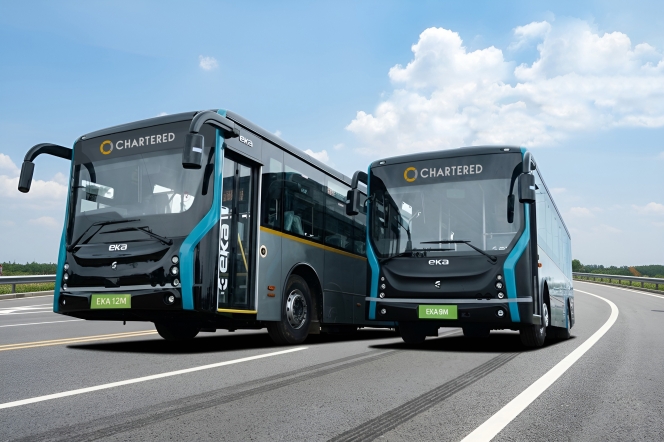
Chartered Speed and EKA Mobility have received a Letter of Confirmation of Quantity (LOCQ) to deploy 1,750 electric buses in Bengaluru under the PM E-Drive Scheme. This allocation accounts for approximately 39 percent of the city's total planned induction of 4,500 electric buses. The initiative is part of the Bengaluru Metropolitan Transport Corporation effort to expand its network in line with the decarbonisation roadmap of the Government of India.
The partnership combines the operational services of Chartered Speed with the vehicle manufacturing and technology of EKA Mobility. Operational protocols for the fleet include maintenance, battery monitoring, and driver training. Chartered Speed has stated its intention to transition 25 percent of its total fleet to electric power by Fiscal 2027.
The deployment aims to support public transport infrastructure in the region through investments in charging and maintenance facilities. Bengaluru is currently expanding its electric transport capacity to meet state mobility targets. The project focuses on providing urban transport solutions for the city's commuter base while reducing the carbon footprint of the public system.
Sanyam Gandhi, Whole-Time Director, Chartered Speed, said, “Bengaluru is a key mobility hub in India, and electric buses are part of the efforts to build a cleaner and more efficient public transport system. The PM E-Drive allocation strengthens Chartered Speed Limited’s long-term commitment to sustainable mass mobility. As one of the early adopters of e-mobility, we aim to convert around 25% of our fleet to electric by Fiscal 2027, supported by strong infrastructure investments to deliver commuter-centric services aimed at lasting socio-economic impact.”
Rohit Srivastava, Business Head & Chief Growth Officer, EKA Mobility, added, “The PM E-Drive initiative is a powerful enabler of India’s electric mobility vision, and Bengaluru’s large-scale adoption of electric buses sets a strong benchmark for urban transport transformation. At EKA Mobility, we are proud to partner with Chartered Speed and contribute to Bengaluru’s journey towards a more sustainable urban future. It is not just about scale, but about creating cleaner mobility solutions, quieter streets, and a better daily commute for millions.”
Suzuki Opens Second Biogas Plant In Gujarat
- By MT Bureau
- January 20, 2026
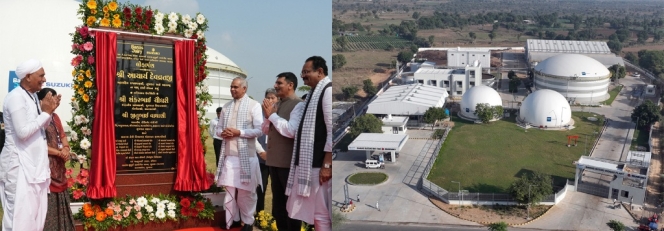
Suzuki Motor Corporation and its subsidiary, Suzuki R&D Centre India (SRDI), have inaugurated the Banas Suzuki Biogas Plant in Bhukhala, Gujarat. The facility, which opened on 18 January 2026, is the second such plant following the Agthala site that commenced operations in December 2025.
The plant is designed to process up to 100 tonnes of cow dung per day to produce approximately 1.5 tonnes of biogas. This output is equivalent to the daily fuel requirements of 850 compressed natural gas (CNG) vehicles. In addition to fuel production, the facility will sell organic fertiliser generated as a byproduct of the process.
The project is part of an agreement signed in September 2023 between SRDI, the National Dairy Development Board (NDDB) and Banas Dairy. The partners have agreed to construct a total of five biogas plants in the region. The Bhukhala site covers an area of 27,000 square metres and forms a component of Suzuki’s strategy to support carbon neutrality in India.
The use of biogas serves as a carbon-neutral alternative for CNG vehicles, which currently represent 20 percent of the Indian passenger car market. Beyond emission reductions, the initiative is intended to improve energy self-sufficiency and increase rural income through the purchase of cattle waste from local farmers.
The opening ceremony was attended by Acharya Devvrat, Governor of Gujarat and Shankar Chaudhary, Chairman of Banas Dairy and Speaker of the Gujarat Legislative Assembly. Representing Suzuki was Kenichiro Toyofuku, Managing Officer and Executive General Manager of Biogas Operations.
The company stated that it will continue to develop its biogas business to contribute to national growth and environmental targets. The operation is expected to create jobs within the district while providing fuel for high-demand vehicle segments.







Comments (0)
ADD COMMENT